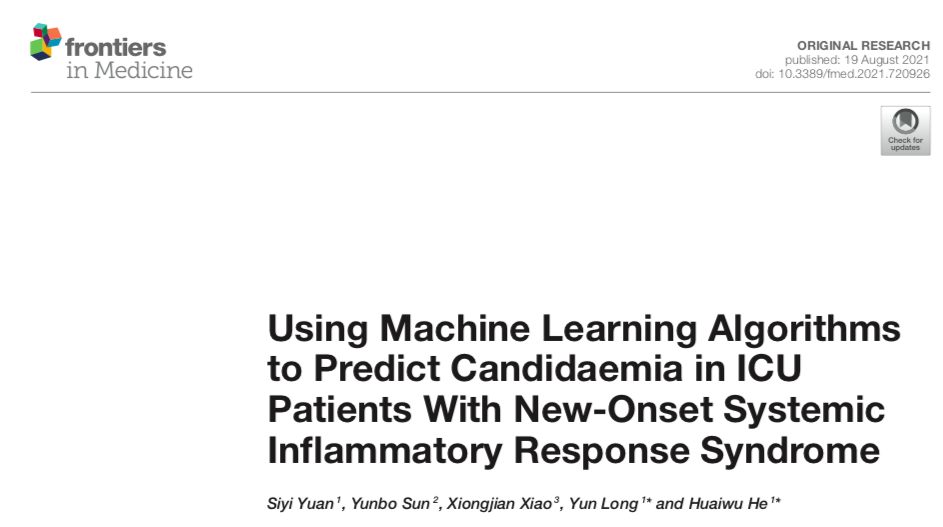Study Results of Peking Union Medical College Hospital’s Intensive Care Unit Artificial Intelligence Collaboration by Yidu Tech’s Affiliate HLT Published in International Journal
2021-10-15 | Press Releases
Recently, the research team of Director Yun Long of Peking Union Medical College Hospital (PUMCH) published the paper “Using Machine Learning Algorithms to Predict Candidaemia in ICU Patients With New-Onset Systemic Inflammatory Response Syndrome” in Frontiers In Medicine. The paper introduces a prediction model of Candida infection established by Director Yun Long's research team in collaboration with Happy Life Tech (HLT), an affiliate of Yidu Tech.

Dr. Long discussed the implications of the findings, saying, "The clinical practice of intensive care medicine is filled with massive, structured data, which is an original record of objective existence that contains key information to reveal clinical presentation. Identifying the relationship between data and clinical presentation is the key to critical care and will also be the cornerstone of future developments of big data in clinical practice, especially in ICU settings. Previous research about big data in ICU has promoted the progress of critical care in many fields including prediction, typing, and treatment decision-making. Clinical diagnosis and treatment models driven by ICU big data and artificial intelligence (AI) will become an important development direction of intensive care medicine in the future. The future of big data and AI as applied to ICU is on the way. Decision-making will be driven by data, and thinking will be guided by AI."
Establishing a scientific, precise, efficient, and reasonable medical service system is a significant component of the "Healthy China 2030" strategy as well as an important trend in the development of China's medical industry. The development of new technology is essential to promoting high-quality hospitals and the improving medical services. PUMCH has been the pioneer in practicing smart medical services. HLT, in collaboration with the Department of Critical Care Medicine at PUMCH, has established an AI prediction model by closely combining AI with medicine, which provides an efficient basis for decision-making in clinical diagnosis and treatment.
Candidaemia is a common but potentially life-threatening blood infection in clinical practice. Distinguishing ICU patients with candidaemia can help with the precise prescription of antifungal drugs to create personalized guidelines. The gold standard for the diagnosis of candidiasis is to culture Candida from sterile specimens or isolate Candida from pathological tissues, but the sensitivity of these two methods is limited. While considering these limitations, director Yun Long's team utilized a machine learning algorithm provided by HLT to develop a model to predict candidaemia in patients with systemic inflammatory response syndrome (SIRS) who had been hospitalized in the ICU in 3A hospitals.
In this retrospective, observational study, a candidaemia prediction model was constructed for patients with SIRS in the ICU in three 3A hospitals within the authorized range. According to the inclusion and exclusion criteria, the data of the three hospitals were cleaned, normalized, and structured, resulting in a total of 8,002 samples, including 137 positive samples and 7,865 negative samples. The imbalance of data was solved using the SMOTE algorithm.
The research team constructed 5 models: Logistic Regression (LR), Support Vector Machine (SVM), Random Forest (RF), ExtraTrees (ET), and XGBoost. The area under the curve (AUC) of 5-fold cross-validation was used as an evaluation index to measure whether the model was improved, and the XGBoost model outperformed the other models over multiple evaluation indexes, including sensitivity, specificity, positive predictive value, negative predictive value, and AUC.
The XGBoost model can identify 84% of patients with Candida infection and has a negative predictive value of 99%. This enables not only quick recall of patients at risk of infection followed by timely treatment to reduce mortality and disease burden of patients, but also better assistance to clinicians in making medical decisions and allocating medical resources in a more reasonable manner, prioritizing more resources to patients at high risk.
The diagnosis and prediction of diseases is a complex science. To make a reasonable and timely diagnosis when dealing with complicated clinical presentation requires not only profound clinical knowledge and solid clinical thinking, but also the experience gained from continuous clinical practice. By establishing an early prediction model for diseases, the quality of medical services can be improved, allowing the diagnosis and treatment of disease to become more accurate, ultimately improving outcomes in public healthcare.
In the future, HLT will continue to foster the development of AI in the medical and healthcare industry by contributing to the growth of more intelligent and efficient medical service systems, thereby strengthening technological innovation in clinical medicine while accelerating the transformation and application of clinical research achievements.


 津公网安备 12011502000526号
津公网安备 12011502000526号